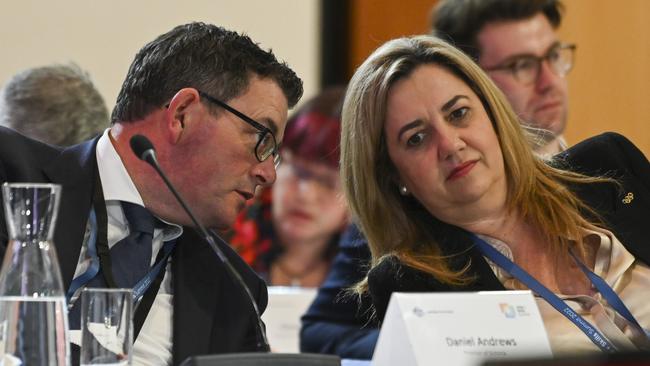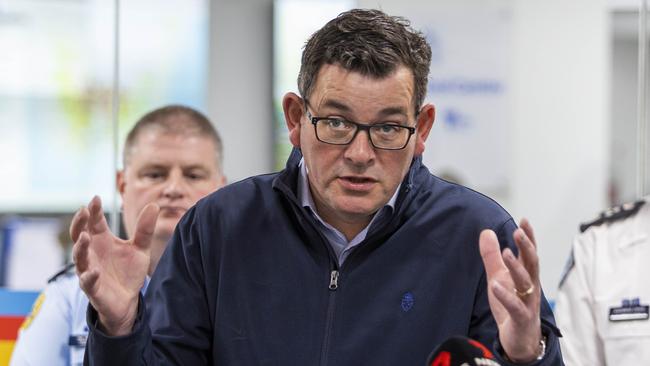Daniel Andrews responds to independent review into Covid response ‘overreach’
Daniel Andrews and Annastacia Palaszczuk react to a review into Australia’s Covid-19 response and the economic and social havoc wreaked by government ‘overreach’.

The Premiers of Victoria and Queensland have both defended decisions made by their governments during the pandemic.
Responding to a damning independent review into Australia’s Covid-19 response and the economic and social havoc wreaked by government “overreach”, Daniel Andrews said “there are many things we wish we didn’t do - many decisions we wish we didn’t make’’.
The Victorian government’s response to Covid saw some of the harshest Covid measures in the nation with Melbourne in lockdown for 262 days, or nearly nine months, the longest lockdown in the world.
“That’s why when I say to you that these decisions were not made lightly and they were the subject of debate and discussion and very careful consideration,’’ he said. “And the challenge is to weigh up those consequences versus having death rates like they did in Italy, like they did in the United States, like they did in the United Kingdom.”

Annastacia Palaszczuk also stood by her state’s strict Covid-19 border policies which kept families separated for almost two years.
Responding to the review into Australia’s pandemic response, which found policies were enforced in ways that lacked fairness and compassion, the Queensland premier said her state had a “world leading response”.
“I think the pandmeic has had long term impacts on a wide range of people, not just because of border closures,” she said.
“I stand by the decisions that the chief health officer made at the time that I backed in.
“I stand by our world leading result when it comes to the number of lives lost compared to other jurisdictions and what happened around the world.”
Asked if, with the benefit of hindsight, she would implement border policies in the same way, Ms Palaszczuk said: “I stand by all the decisions that were made”.
“We made the decisions in the best interest of Queenslanders and it kept Queenslanders safe.”
“It was an unprecedented time, a time I hope we never have to go back to again.
“A time when we stepped up and did everything we possibly could during a pandemic, the likes of which no one has seen in our lifetime before.”
Most vulnerable ‘bore the brunt’
The independent review found schools should have remained open and lockdowns and border closures were avoidable at the pandemic height.
The review, funded by the Paul Ramsay Foundation, John and Myriam Wylie Foundation and Andrew Forrest’s Minderoo Foundation, said the nation’s most vulnerable communities were excluded from financial support and “bore the brunt” of the pandemic.
Western Sydney University chancellor and former department of prime minister and cabinet secretary Peter Shergold, who was appointed to lead the review in April, said while the fog of uncertainty clouded life-and-death decisions, “this does not mean we could not have done better”.

The 97-page Fault Lines review says “it was wrong to close entire school systems, particularly once new information indicated that schools were not high-transmission environments”.
“For children and parents (particularly women), we failed to get the balance right between protecting health and imposing long-term costs on education, mental health, the economy and workforce outcomes,” the review says.
“Rules were too often formulated and enforced in ways that lacked fairness and compassion. Such overreach undermined public trust and confidence in the institutions that are vital to effective crisis response.”
The review was informed by consultations with about 200 health experts, public servants, epidemiologists, unions, community groups, businesses and economists, more than 160 submissions and 3000 hours of research, policy and data analysis.
It found lockdowns and border closures, which triggered significant social and economic costs, should have been a “last resort”.
“Too many of Australia’s lockdowns and border closures were the result of policy failures in quarantine, contact tracing, testing, disease surveillance and communicating effectively the need for preventive measures like mask wearing and social distancing.”
“Politics also played a role. Localised outbreaks were inevitable. Statewide and nationwide outbreaks were not.”
The review panel, which included University of Queensland chancellor and former department of foreign affairs and trade secretary Peter Varghese, Macquarie Group director Jillian Broadbent and former Young Australian of the Year Isobel Marshall, made six recommendations to avoid repeating mistakes in future health crises.
These include establishing an independent, data-driven Australian Centre for Disease Control and Prevention, clearly defining national cabinet roles and responsibilities in a crisis, publicly releasing modelling used in government decision-making, regular pandemic scenario testing and the sharing and linking of data between jurisdictions.
In April, former Paul Ramsay Foundation chief executive Glyn Davis – who was appointed to lead Anthony Albanese’s department following the May 21 election – said the review would ensure Australia was “more ready and resilient for whatever comes next”.
Doherty Institute director Sharon Lewin was initially appointed to the independent review panel but stepped down to avoid any perceived conflicts of interest.
Despite early successes, “ultimately pandemic planning proved to be inadequate” as governments “overreached”, older Australians were left vulnerable and spiralling costs racked up historic debt levels.
“Federal government net debt has risen from 19 per cent of GDP in 2019 to 28 per cent of GDP in 2022. It will take more than 20 years to return to Australia’s pre-Covid debt-to-GDP level if the economy returns to its long-run GDP growth rate,” the review said.
“Total debt across the states and territories is almost four times as high as it was in 2019.
“Restoring fiscal policy buffers is essential to provide sufficient firepower to respond to the next crisis.
“Governments will need to decide who should bear the cost of budget repair and how much of it will fall on young people.”
Citing poor transparency around decision-making, the review said Covid-19 policies were “designed and implemented without proper regard for the inequalities that already existed in our society and the vulnerabilities of particular communities”.
“(For some) Covid-19 will be a story of trauma, isolation and terrifying uncertainty. It will be a story of being locked in overcrowded housing, job loss and missing out on government supports,” the review said.
“It will be a story of more domestic violence, increased alcohol abuse, deteriorating mental and physical health. It will be a story of loss and the brutal realisation of not being able to say final goodbyes to loved ones.
“Only 2660 out of 33,252 exemption applications were granted in Victoria. Families were kept apart, even when there were strong compassionate reasons to facilitate an exemption.”
The review criticised short-term casual and temporary migrant workers being excluded from JobKeeper wage subsidies, which has been partly blamed for the current labour shortage crisis, as well as the “fiscally irresponsible” failure to recoup payments from businesses that banked sizeable profits.
Professor Shergold said in future crises, “we need to place vulnerable Australians at the centre of our planning”.



